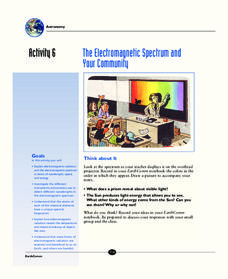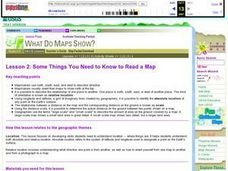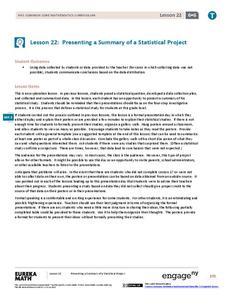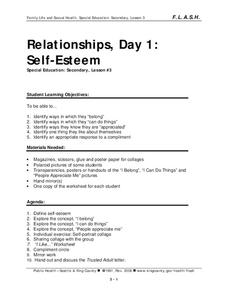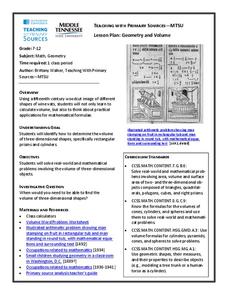Overcoming Obstacles
Problem Solving at Home
The final lesson in the "Problem Solving Module" focuses on finding creative solutions to problems that might arise at home. Individuals then create a storyboard that illustrates how they would apply the six-step problem-solving process...
It's About Time
The Electromagnetic Spectrum and Your Community
Do you have blossoming astronomers who seek to understand the electromagnetic spectrum? Assist them with exploring electromagnetic radiation and the electromagnetic spectrum as the class conducts various activities to demonstrate...
Curated OER
Some Things You Need to Know to Read a Map
Students study things the you need to know to read a map and explain location.
King Country
Lesson 7: Relationships - Day 5: Acquaintances & Strangers
What is the difference between a friend and an acquaintance? What about an acquaintance and a stranger? As part of a unit on Family Life and Sexual Health (FLASH), class members role play appropriate responses to situations involving...
Constitutional Rights Foundation
History of Immigration Through the 1850s
Everyone living in the United States today is a descendant from an immigrant—even Native Americans. Learn about the tumultuous history of American immigration with a reading passage that discusses the ancient migration over the Bering...
Curated OER
Posters for a Charity
Students examine Keith Haring's work. They create posters influenced by Haring that aim to inspire awareness and change.
Curated OER
Create Your Own Sporting Event
Students use their imagination and language skills to create and describe their own sporting event. In this sporting event lesson, students brainstorm sports related vocabulary and identify their parts of speech. Students categorize the...
EngageNY
Presenting a Summary of a Statistical Project
Based upon the statistics, this is what it means. The last instructional activity in a series of 22 has pupils present the findings from their statistical projects. The scholars discuss the four-step process used to complete the project...
Museum of Tolerance
Quilt Activity
After completing the first five lessons from the series, scholars assemble their quilt pieces to create a family history quilt. They then rate their experience of learning about their families by conducting interviews, creating family...
Curated OER
Relationships, Day 5: Acquaintances & Strangers
It is important for special needs students to know the differences between acquaintances and strangers. They define the world helper, acquaintance, and stranger then discuss a scenario based case study.They talk about touch and no touch,...
Curated OER
Relationships, Day 1: Self-Esteem
Expose your secondary special education class to the importance of belonging and feeling accepted. They define self-esteem, pride, and appreciation. Then create a self collage and share what they like about themselves with the class. A...
NASA
Century Timeline
Scholars use the Cosmic Times and the Internet to create a timeline of events from 1916 when Einstein presented the Theory of General Relativity to 2016. Scientific discoveries are the main focus, then pupils add in events from culture,...
College Board
2004 AP® Calculus AB Free-Response Questions Form B
The test is not all about skills. The six free-response questions contain two real-world application problems. Those items deal with populations and velocities. The other four questions ask pupils to show their knowledge of calculus...
Missouri Department of Elementary
Are You Balanced?
Balance scales create a strong visual of how an individual prioritizes one's self alongside their commitments to the community, school, and home. Scholars complete a graphic organizer then discuss their findings with their peers. A...
Chicago Botanic Garden
Migration, Adaptation, and Changing Climates
People adjust to their environments without even thinking about it—even if it's simply throwing on a sweatshirt. Lead the class in a discussion about the adjustments people make in their daily lives as an introduction to adaptations,...
NOAA
Motion from the Ocean
Create a fish mobile using cardboard and string to hang in the classroom while studying ocean life. Each printable requires pupils to cut out two of the same fish to create consistency on the front and back.
Missouri Department of Elementary
The Problem Solving Game
Creativity, communication, cooperation. Pupils assume the role of employees at a game factory working together to develop a new game. Using the principles of the STAR method (Stop, Think, Act, Review), they work in teams to create game...
Polar Trec
Family Polar Fun Day
Family fun days are great for connecting home and school life, building strong parent/teacher relationships, and engaging students in a fun and social way. Here are several activity ideas to help you and your class run your own Family...
Owl Teacher
Imaginary Nation: Constructing a Map
Your young geographers will combine what they have learned about the five themes of geography and their inner creativity to design a physical map for an imaginary nation.
Virginia Department of Education
Geometry and Volume
The history of math is fascinating! Utilize a woodcut primary source image from 1492 and posters from the 1930s to help geometers apply their volume-calculation skills to real-life questions.
Museum of Disability
Stand Tall, Molly Lou Melon
Help to create the next generation of friends with a instructional activity about accepting people who are different. As kids read Stand Tall, Molly Lou Melon, they answer a series of discussion questions and activities about...
Mathematics Assessment Project
Estimating Length Using Scientific Notation
Would you rather have a million dollars or 1 x 10^6 dollars? To find the answer to this question, class members first complete an assessment task converting numbers between decimal notation and scientific notation. They then take...
National Woman's History Museum
Real Life Rosie the Riveters
There was more than one Rosie the Riveter. To learn more about the contributions women made to the World War II war effort, groups become expert on different "Rosie" and share their findings in a Jigsaw activity. The lesson concludes...
Pace University
Grades 7-8 Mean, Median, and Mode
Take a central look at data. The differentiated lesson provides activities for pupils to calculate central tendencies. Scholars begin choosing three central tendency activities from a Tic-Tac-Toe board. Learners then choose from sports,...



